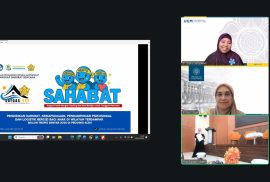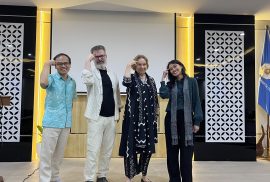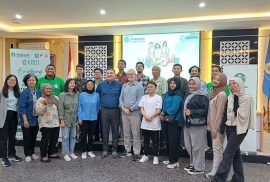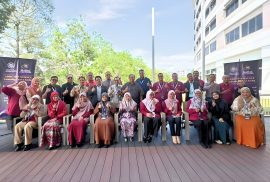Diana Setiyawati, S.Psi., MHSc., Ph.D., Psikolog, a lecturer at the Faculty of Psychology, Universitas Gadjah Mada (UGM), is one of the grantees of the Community Service Program for Emergency Disaster Response in the Provinces of Aceh, North Sumatra, and West Sumatra funded by the Directorate of Research and Community Service (DPPM), Ministry of Higher Education, Science, and Technology. She received funding for a program entitled “Integrated Psychosocial Recovery Program for Communities Affected by Floods in Sumatra.”
SDG 3: Good Health and Well-being
The Laboratory of Mental Processes and Behaviour (PMB), Faculty of Psychology, Universitas Gadjah Mada, held an international seminar titled “Studying Mental Processes Using EEG/ERP” on Friday (05/12). The event, attended by 40 participants, was conducted in a hybrid format—via Zoom Meeting and on-site in Room A-203 at the Faculty of Psychology UGM. This seminar served as a platform for knowledge sharing and scientific discussion on the use of EEG and ERP in studying human mental processes.
The Faculty of Psychology, Universitas Gadjah Mada, in collaboration with TVRI Yogyakarta, once again presents OPSI: Obrolan Psikologi (Psychology Talk) in its seventeenth episode, aired on Tuesday, 2 December 2025, from 15:00 to 16:00 WIB. This episode raises the theme “The Dilemma of Two Worlds: Work vs Family,” discussing the challenges faced by families in which both partners are working. The episode invites the public to understand the dynamics of roles and demands between the workplace and family life, as well as the importance of communication, fair division of roles, and emotional awareness in maintaining harmonious relationships.
The Faculty of Psychology, Universitas Gadjah Mada (UGM), in collaboration with Kesehatan Mental Tuli Indonesia (KMTI), organized a training titled “Bridging Minds: Mental Health Training for Deaf Leaders and Mental Health Professionals” on 20–21 November 2025 at the Faculty of Psychology UGM. This activity is part of a broader initiative to strengthen inclusive mental health support for Deaf communities in Indonesia.
The Faculty of Psychology at Universitas Gadjah Mada (UGM) held a series of activities titled Wellness Day: Maintaining Body and Mind in Harmony on Friday (14/10). The in-person event was attended by lecturers and administrative staff of the Faculty of Psychology.
The Center for Indigenous and Cultural Psychology (CICP) of the Faculty of Psychology, Universitas Gadjah Mada, participated in the u’GOOD Inaugural Conference titled “Thriving Together: Youth, Relational Wellbeing and the Future of the Global South,” held from October 7–9, 2025, in Dar es Salaam, Tanzania. This inaugural conference served as the official launch of u’GOOD research projects across 9 Global South countries and marked the initial meeting of a Community of Practice (CoP) aimed at strengthening cross-national and interdisciplinary collaborations.
Prof. Drs. Subandi, M.A., Ph.D., Psikolog, a lecturer at the Faculty of Psychology, Universitas Gadjah Mada (UGM), was invited to serve as both facilitator and speaker at the Psychospirituality and Recovery of Substance Use Disorders Workshop, organized by the Malaysian Association of Drug Addiction Counselors (MADAC) in collaboration with Universitas Gadjah Mada (UGM). This event was held from 26–29 October 2025 at the Royal Park Hotel @UNITEN, Bangi, Malaysia.
Mental health promotion across generations has become increasingly crucial in today’s rapidly changing world, especially for young people navigating complex family, educational, and digital environments. Responding to this global need, the Center for Public Mental Health (CPMH), led by Dr. Diana Setiyawati, M.HSc., Psikolog., in collaboration with the Center for Life-Span Development (CLSD), headed by Aisha Sekar Laziardi Rachmanie, M.Psi., Psikolog., – both under the Faculty of Psychology, Universitas Gadjah Mada (UGM), proudly held the International Course on Public Mental Health (ICPMH) 2025 with the theme “Bridging Generations: Thriving Youth, Supportive Families, Collaborative Schools”. This programme aimed to explore strategies for strengthening youth well-being through supportive family relationships, collaborative school engagement, and active community involvement.
Non-Suicidal Self-Injury (NSSI), or self-harming behavior without suicidal intent, is increasingly observed, particularly among adolescents and young adults. In Indonesia, several studies indicate that this phenomenon appears in everyday settings, influenced by emotional pressure, unsupportive social relationships, and the growing complexity of life challenges. A research team from the Faculty of Psychology, Universitas Gadjah Mada (UGM) is developing a psychoeducational module on NSSI designed as a first step to understand this behavior, reduce stigma, and help individuals and their immediate circles respond more appropriately. This initiative is funded by the 2025 Research Grant of the Faculty of Psychology UGM.
Bullying remains a serious issue in the education sector, as it has a direct impact on students’ mental health. Data from the Ministry of Women’s Empowerment and Child Protection (KPPPA, 2022) shows that one in four Indonesian adolescents has experienced physical or psychological violence. This condition indicates that bullying is not merely an individual behavioral problem, but also a reflection of a school ecosystem that is not yet fully safe and supportive for students’ psychological development.








